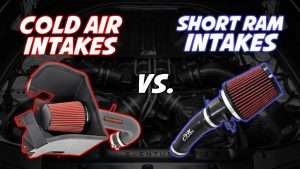
In the world of heavy-duty trucks, the battle between Ford and Chevy has always been fierce. Two popular engine options that truck enthusiasts often debate about are the Ford 7.3 vs Chevy 6.6 gas engine. Both powerhouses offer impressive performance and reliability.
In this article, we will dive deep into the features, specifications, and key differences between these engines to help you make an informed decision.
Table of Contents
Overview of Ford 7.3 Gas Engine
The Ford 7.3 Gas Engine is a legendary workhorse known for its exceptional power and reliability. With a displacement of 7.3 liters, this V8 engine delivers impressive performance across a wide range of applications.
Whether you’re hauling heavy loads or towing large trailers, the Ford 7.3 Gas Engine offers the muscle you need to get the job done.
Key Features and Performance of Ford 7.3 Gas Engine
The Ford 7.3 Gas Engine is packed with a multitude of key features that contribute to its exceptional performance and reliability. Let’s explore some of the standout features:
- Advanced Fuel Injection Technology: The engine incorporates advanced fuel injection technology, ensuring precise fuel delivery and efficient combustion. This results in optimized power output, improved fuel economy, and reduced emissions.
- High-Strength Construction: The Ford 7.3 Gas Engine is built with a high-strength cast iron block and aluminum cylinder heads, providing durability and resistance to heavy loads and challenging conditions. These robust components enhance the engine’s reliability and longevity.
- Variable Camshaft Timing: The engine utilizes variable camshaft timing, which adjusts the timing of the engine’s valves to optimize performance and efficiency based on driving conditions. This technology enhances power delivery and fuel efficiency across various RPM ranges.
- Power and Torque: The Ford 7.3 Gas Engine offers impressive power and torque ratings. With horsepower ranging from 350 to 430 and torque from 475 to 475 lb-ft, the engine delivers the muscle needed for demanding tasks such as towing and hauling heavy loads.
- Exceptional Towing and Hauling Capability: The Ford 7.3 Gas Engine is renowned for its exceptional towing and hauling capability. With its robust design and high torque output, it provides the strength and confidence required for towing trailers, carrying heavy payloads, and tackling challenging terrains.
- Responsive Acceleration: The engine’s design and performance characteristics ensure responsive acceleration, allowing for quick and confident overtaking and merging on highways. The Ford 7.3 Gas Engine delivers power when you need it, making it suitable for both work and recreational driving.
- Reliable Start-Up and Cold-Weather Performance: The engine incorporates features to enhance reliable start-up, even in extreme weather conditions. Cold-weather performance is optimized, ensuring the engine starts smoothly and quickly, making it reliable in harsh climates.
The combination of these key features results in a powerful, reliable, and versatile engine. Whether you’re towing heavy loads, tackling off-road adventures, or seeking a dependable work companion, the Ford 7.3 Gas Engine offers the performance and durability to meet your needs.
Key Features and Performance of Chevy 6.6 Gas Engine
The Chevy 6.6 Gas Engine comes with a range of key features that contribute to its impressive performance and reliability. Here are some notable features:
- Direct Fuel Injection: The Chevy 6.6 Gas Engine incorporates direct fuel injection technology, which enables precise fuel delivery directly into the combustion chamber. This results in improved fuel efficiency, power output, and reduced emissions.
- Variable Valve Timing: The engine is equipped with variable valve timing, which optimizes the opening and closing of the engine’s valves based on operating conditions. This technology enhances overall performance, responsiveness, and fuel efficiency.
- Advanced Cooling System: The Chevy 6.6 Gas Engine utilizes an advanced cooling system that ensures optimal temperature regulation. Efficient cooling helps maintain engine performance and prevents overheating, especially during heavy-duty towing or hauling.
- High-Strength Materials: To enhance durability and reliability, the engine features high-strength materials in critical components such as the cylinder heads and engine block. These components are designed to withstand the demands of heavy-duty applications.
- Enhanced Air Intake System: The engine is equipped with an enhanced air intake system, which allows for improved airflow into the engine. This optimized airflow enhances combustion efficiency, resulting in increased power and torque.
In terms of performance, the Chevy 6.6 Gas Engine delivers impressive power and capability. With horsepower ratings ranging from 401 to 427 and torque ratings between 464 and 464 lb-ft, it provides the strength needed for demanding tasks.
The engine’s power output, combined with its advanced features, allows for confident acceleration, smooth towing, and efficient hauling. Whether you’re towing a trailer or carrying a heavy payload, the Chevy 6.6 Gas Engine offers the performance and reliability to get the job done.
Overall, the Chevy 6.6 Gas Engine is a formidable powerplant that combines advanced technologies, robust construction, and impressive performance.
Its key features contribute to enhanced efficiency, durability, and the ability to handle a wide range of applications.
Advantages of Ford 7.3 Gas Engine
One of the significant advantages of the Ford 7.3 Gas Engine is its robustness. Built with heavy-duty components, it can handle demanding conditions without breaking a sweat.
Whether you’re traversing rugged terrains or towing heavy trailers uphill, this engine excels in providing the necessary power and reliability.
Furthermore, the availability of a wide range of power ratings allows customers to choose the perfect configuration that suits their specific needs.
Whether you prioritize torque for towing or horsepower for acceleration, the Ford 7.3 Gas Engine offers flexibility in tailoring the engine’s performance to your requirements.
Advantages of Chevy 6.6 Gas Engine
The Chevy 6.6 Gas Engine offers several advantages that make it a worthy competitor to the Ford 7.3 Gas Engine.
One notable advantage is its impressive power output. With horsepower ratings ranging from 401 to 427 and torque ratings between 464 and 464 lb-ft, the Chevy 6.6 Gas Engine provides ample strength for towing and hauling heavy loads.
Moreover, the Chevy 6.6 Gas Engine incorporates advanced technologies such as variable valve timing and an advanced cooling system, further enhancing its performance and efficiency.
These features contribute to smooth power delivery, improved fuel economy, and reduced emissions.
Comparison of Ford 7.3 Vs Chevy 6.6 Gas Engine
Now let’s delve into the comparison between the Ford 7.3 vs Chevy 6.6 Gas Engine, considering various aspects that are crucial for truck owners.
Power and Torque
When it comes to power and torque, both engines offer impressive performance. The Ford 7.3 Gas Engine boasts higher horsepower ratings, ranging from 350 to 430, compared to the Chevy 6.6 Gas Engine’s range of 401 to 427 horsepower.
However, the torque ratings of both engines are identical at 475 lb-ft.
Ultimately, the choice between the two engines depends on your specific requirements. If you prioritize raw horsepower for faster acceleration and higher top speed, the Ford 7.3 Gas Engine might be the preferred option.
On the other hand, if torque for towing and hauling capabilities is your primary concern, the Chevy 6.6 Gas Engine could be the better choice.
Fuel Efficiency
Fuel efficiency is an essential consideration, particularly for those who use their trucks for daily commuting or long-distance travel.
In this aspect, the Chevy 6.6 Gas Engine tends to offer slightly better fuel economy compared to the Ford 7.3 Gas Engine.
The Chevy 6.6 Gas Engine’s advanced fuel injection technology and other efficiency-enhancing features contribute to its better mileage.
However, it’s important to note that the fuel efficiency of both engines can vary depending on driving conditions, load, and other factors.
Towing and Hauling Capabilities
Truck owners often rely on their vehicles’ towing and hauling capabilities for various tasks, whether it’s towing a trailer, hauling equipment, or transporting heavy loads.
In terms of towing and hauling, both the Ford 7.3 Gas Engine and the Chevy 6.6 Gas Engine excel.
The Ford 7.3 Gas Engine’s robustness and broad power range make it a formidable choice for heavy-duty towing and hauling. With its exceptional torque output, it can handle demanding tasks with ease.
Similarly, the Chevy 6.6 Gas Engine’s high power and torque ratings make it a reliable companion for towing and hauling.
Durability and Reliability
Durability and reliability are crucial factors to consider when choosing an engine for your truck. Both the Ford 7.3 vs Chevy 6.6 Gas Engine have a solid reputation for their long-lasting performance.
The Ford 7.3 Gas Engine, with its heavy-duty components and robust construction, is renowned for its durability in demanding conditions.
The Chevy 6.6 Gas Engine, too, incorporates durable materials and advanced engineering to ensure its reliability over the long term.
Price and Cost of Ownership
Price and cost of ownership are practical considerations for any vehicle purchase. The exact pricing for the Ford 7.3 vs Chevy 6.6 Gas Engine can vary based on the truck model and additional features.
It’s advisable to check with dealerships for accurate pricing information.
When considering the cost of ownership, factors such as fuel economy, maintenance, and repair expenses come into play. While the initial price of the engine is an important consideration, it’s crucial to also evaluate long-term costs.
In terms of pricing, the Ford 7.3 Gas Engine may have a slightly higher upfront cost compared to the Chevy 6.6 Gas Engine.
However, it’s essential to consider the overall value and performance that each engine offers for the price.
When it comes to maintenance and repair expenses, both engines are designed to be durable and reliable.
However, the availability and cost of replacement parts may vary. It’s recommended to consult with authorized service centers and compare the cost of maintenance and repairs for each engine.
Customer Satisfaction and Reviews
One way to gain insights into the real-world performance and customer satisfaction of the Ford 7.3 Gas Engine and the Chevy 6.6 Gas Engine is to explore customer reviews and feedback.
It’s always beneficial to hear from truck owners who have hands-on experience with these engines.
Customers’ opinions can provide valuable information on factors such as engine performance, reliability, fuel economy, and overall satisfaction.
Online forums, truck enthusiast communities, and reputable automotive websites are great sources to find customer reviews and ratings for both engines.
Conclusion
Choosing between the Ford 7.3 Gas Engine and the Chevy 6.6 Gas Engine requires careful consideration of various factors.
Both engines offer exceptional power, performance, and reliability, making them formidable choices for truck owners.
The Ford 7.3 Gas Engine stands out with its robustness, wide range of power options, and impressive torque. It excels in heavy-duty tasks and provides versatility for different applications.
On the other hand, the Chevy 6.6 Gas Engine offers solid performance, advanced technologies, and slightly better fuel efficiency.
Ultimately, the decision should be based on your specific needs and priorities, whether it’s raw power, towing capabilities, fuel efficiency, or long-term value.
It’s recommended to test drive vehicles equipped with both engines, consider expert opinions, and weigh the pros and cons based on your individual requirements.
FAQs (Frequently Asked Questions)
- Q: Can the Ford 7.3 Gas Engine run on alternative fuels like E85?
A: Yes, the Ford 7.3 Gas Engine is compatible with E85, which is a blend of 85% ethanol and 15% gasoline. - Q: How does the Chevy 6.6 Gas Engine compare to its diesel counterpart in terms of towing capacity?
A: The Chevy 6.6 Gas Engine offers impressive towing capacity, but the diesel variant generally provides higher towing capabilities due to its torque output. - Q: Are there any specific maintenance requirements for these engines?
A: Both engines have recommended maintenance schedules outlined in their respective owner’s manuals. Regular oil changes, filter replacements, and periodic inspections are essential for optimal performance and longevity. - Q: Can I retrofit the Ford 7.3 vs Chevy 6.6 Gas Engine into older truck models?
A: Retrofitting engines requires careful consideration of compatibility, wiring, and other factors. It’s recommended to consult with professionals or authorized dealers for proper guidance. - Q: Do these engines come with any warranty coverage?
A: Both Ford and Chevy provide warranty coverage for their engines. It’s important to review the specific warranty terms and conditions offered by the manufacturers.




